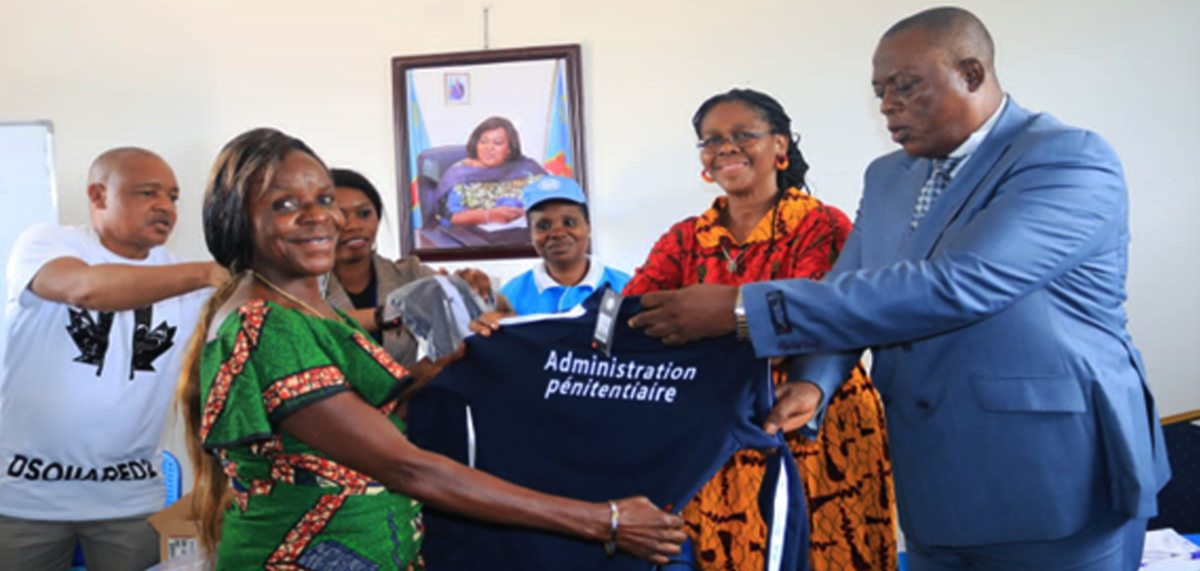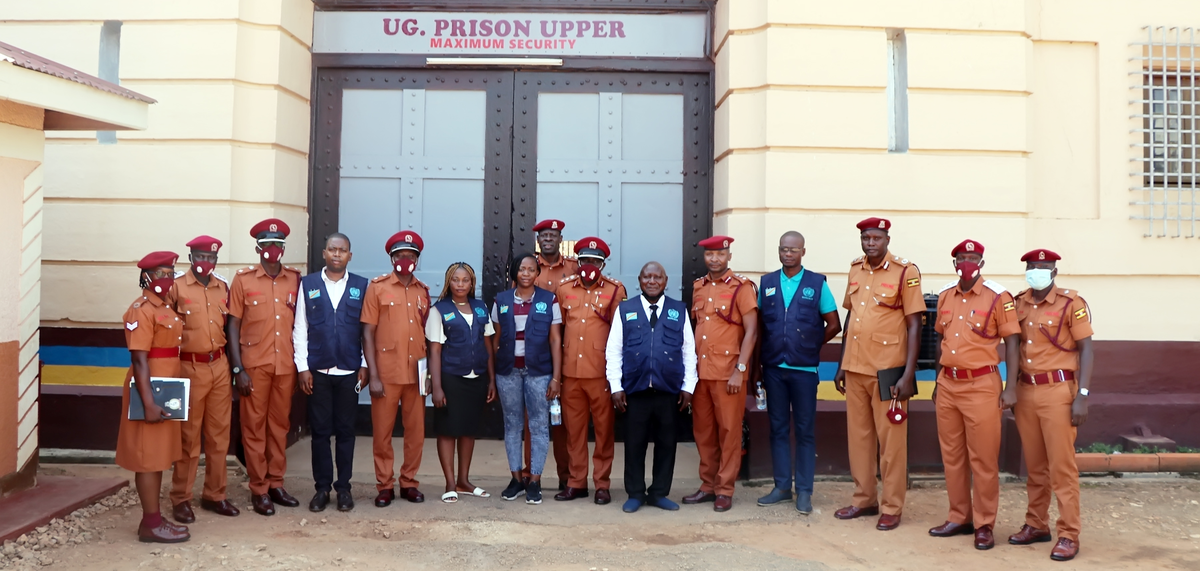Context of the Corrections Unit intervention
In July 2022, the Corrections Unit (CU) came under the direct supervision of the Office of the Deputy Special Representative of the United Nations Stabilization Mission in the Democratic Republic of the Congo (MONUSCO), Resident Coordinator, and Humanitarian Coordinator in the DRC.
The Corrections Unit consists of prison experts/specialists from different countries who possess extensive professional experience and maintain a reputable status. These experts provide daily mentoring, advisory, technical, strategic, and operational support to the national prison authorities. This support aligns with the mission's mandate and aims to enhance prison security, implement legal and institutional reforms within the DRC prison system, and adhere to international standards and practices. It also addresses the management of women prisoners and minors involved in conflicts with the law. The support provided to prison directors and staff encompasses various aspects such as day-to-day prison operations and management, security assessments, incident prevention, ensuring humane treatment of prisoners, and upholding prisoners' rights.
The management of prisons in the DRC is faced with numerous challenges. These challenges include prison overcrowding, prolonged and illegal pre-trial detention, poor management of detainees' data and judicial records, inadequate nutrition, and inadequate healthcare, which leads to high malnutrition and deaths among detainees.
Furthermore, due to limited capacity, all categories of prisoners, including high-risk inmates who are members of armed groups and accused of serious crimes, are incarcerated together in the same prisons. This poses a significant risk, particularly in terms of violence and ill-treatment from fellow prisoners, as well as attacks on prisons by armed groups attempting to free their own members, including leaders.
In light of these challenges, CU is dedicated to providing technical and strategic support to the prison authorities. The aim is to establish a robust, efficient, and humane prison system that can overcome the multiple challenges faced, especially during this transitional period. Additionally, the Unit is committed to developing a comprehensive knowledge base by transferring skills and equipping prison managers and key personnel. This will ensure their operational and managerial effectiveness even after the departure of MONUSCO.
Currently, these interventions are focused on 10 priority prisons in the country where most high-risk/high-value detainees are held. These prisons include:
- Makala Central and Ndolo Military prisons in Kinshasa Province,
- Goma Central and Beni Urban prisons in North Kivu Province,
- Bukavu Central Kabare Territory and Uvira Urban prisons in South Kivu Province,
- Kalemie Central Prison in Tanganyika Province,
- Bunia Central Prison in Ituri Province, and
- Luzumu Detention Camp in Kongo Central Province.
It is important to highlight that our ongoing assistance to Kalemie prison forms an integral component of a collaborative initiative aimed at the withdrawal of MONUSCO from Tanganyika. These prioritized correctional facilities collectively house over 27,000 prisoners as of December 31, 2023, with 77 percent of them being held in pre-trial detention. The prison occupancy rate at the conclusion of the year has reached an unprecedented 548 percent.
Main goals
- Enhancing security measures in high-priority prisons.
- Assisting in the stabilization and improvement of the prison system in the Democratic Republic of Congo (DRC) through reforms and other initiatives.
- Constructing prisons that are increasingly safe, secure, and humane to prevent major security incidents such as mass escapes, attacks, and riots.
- Safeguarding the rights and dignity of prisoners, including provisions for food and sanitation.
- Implementing digital systems for the management and monitoring of prisoners' legal files to streamline case flow management and address prolonged and unlawful pre-trial detentions.
Promoting social reintegration through various programs.

Support for the Reform of the Penitentiary System
Since 2007, the CU has been assisting the Government of DRC in its efforts to reform the prison system in accordance with international standards and practices in prison administration. Up to now, the Unit has offered technical and logistical assistance in the creation of four draft texts. These include the preliminary draft law on fundamental principles related to the prison system, the preliminary draft law on the special status of prison staff, the draft decree on the prison regime, and the decree on the establishment, organization, and functioning of the General Directorate of Prison Administration. Notably, CU has supported the Committees of the National Assembly and the Senate in the adoption of Law 23-038, which determines the fundamental principles governing the penitentiary regime and was promulgated on June 15, 2023. The remaining three drafts are currently awaiting approval at the Council of Ministers.
Furthermore, the CU provides strategic support to the Ministry of Justice in various areas. This includes assistance in the rehabilitation and construction of prisons, the planning and implementation of training programs, and the allocation of human and financial resources. Additionally, the CU aids in the development of national policy documents such as the National Strategy for the Promotion of Gender in Prisons and the Strategy for Combating Radicalization, Violent Extremism, and Terrorism in DRC prisons.

Technical and professional capacity building
CU continues to offer initial and ongoing training to prison and military personnel, aiming to enhance their capabilities in various areas such as prison security, operations, contingency planning, project and financial management, human rights, and the humane treatment of prisoners, including minors and women. This supervision has had a noticeable impact on prisons, leading to significant improvements in search and control methods, as well as the professional demeanor of security personnel.
In addition to the training provided, the CU also facilitates study missions to other countries, allowing for the exchange of experiences with nations that have made significant progress in prison reform and implementing good practices. These exchanges primarily focus on prison management, the treatment of women and children, security, healthcare, social reintegration, and prison production.
To date, the CU has organized several regional study tours in collaboration with partners such as UNDP, UNITAR, and prison administrations in Burkina Faso, Ghana, Kenya, Rwanda, Senegal, South Africa, and Uganda. These study tours aim to broaden the perspectives of DRC prison personnel in prison management.
Furthermore, the CU arranges workshops and seminars that bring together national and international experts to exchange and update their knowledge and experiences in prison security. These events also provide more specialized training on crisis management in prisons, combating radicalization and violent extremism, and conducting simulation exercises. Such activities are regularly organized in prisons and at the training school for prison staff located in Luzumu, which was constructed with the financial assistance of MONUSCO.
It is important to acknowledge that UAAP collaborates with MONUSCO's partners (JSS, JHRO, UNPOL, SSR, Gender) to support prisons in their endeavors.
Contact
MONUSCO – UTEX II
372, Ave Colonel Mondjiba
Concession Immotex (Ex. Utexafrica)
Kinshasa – Ngaliema – DR Congo.
Phone : +243997068916
+243818907510
Email : monusco-corrections-unit-management@un.org
 UN
UN United Nations Peacekeeping
United Nations Peacekeeping
